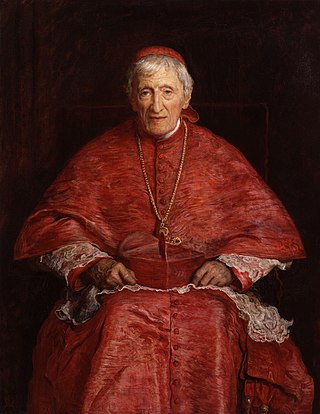Related Research Articles

Lancelot Andrewes was an English bishop and scholar, who held high positions in the Church of England during the reigns of Elizabeth I and James I. During the latter's reign, Andrewes served successively as Bishop of Chichester, of Ely, and of Winchester and oversaw the translation of the King James Version of the Bible. In the Church of England he is commemorated on 25 September with a lesser festival.

John Henry Newman was an English theologian, academic, intellectual, philosopher, polymath, historian, writer, scholar and poet, first as an Anglican priest and later as a Catholic priest and cardinal, who was an important and controversial figure in the religious history of England in the 19th century. He was known nationally by the mid-1830s, and was canonised as a saint in the Catholic Church in 2019.

A sermon is a religious discourse or oration by a preacher, usually a member of clergy. Sermons address a scriptural, theological, or moral topic, usually expounding on a type of belief, law, or behavior within both past and present contexts. Elements of the sermon often include exposition, exhortation, and practical application. The act of delivering a sermon is called preaching. In secular usage, the word sermon may refer, often disparagingly, to a lecture on morals.

Henry Parry Liddon (1829–1890), also known as H. P. Liddon, was an English theologian. From 1870 to 1882, he was Dean Ireland's Professor of the Exegesis of Holy Scripture at the University of Oxford.

Nicholas Patrick Stephen Wiseman was a Cardinal of the Catholic Church who became the first Archbishop of Westminster upon the re-establishment of the Catholic hierarchy in England and Wales in 1850.

John Henry Hobart was the third Episcopal bishop of New York (1816–1830). He vigorously promoted the extension of the Episcopal Church in upstate New York, as well as founded both the General Theological Seminary in New York City and Geneva College in Geneva in the Finger Lakes area .He was the beloved pastor of the Catholic Saint Elizabeth Seton before her conversion to Catholicism.

All Hallows College was a college of higher education in Dublin. It was founded in 1842 and was run by the Vincentians from 1892 until 2016. On 23 May 2014, it was announced that it was closing down, due to decreasing student numbers. The sale of the campus in Drumcondra to Dublin City University was announced on 19 June 2015 and completed on 8 April 2016. The college closed on 30 November 2016, becoming the All Hallows Campus of Dublin City University.

Frederick Oakeley was an English Roman Catholic convert, priest, and author. He was ordained in the Church of England in 1828 and in 1845 converted to the Church of Rome, becoming Canon of the Westminster Diocese in 1852. He is best known for his translation of the Christmas carol Adeste Fideles from Latin into English.

Stopford Augustus Brooke was an Irish churchman, royal chaplain and writer.

Robert Hugh Benson AFSC KC*SG KGCHS was an English Catholic priest and writer. First an Anglican priest, he was received into the Catholic Church in 1903 and ordained therein the next year. He was also a prolific writer of fiction, writing the notable dystopian novel Lord of the World, as well as Come Rack! Come Rope!.
William Henry Sewell, English divine and author, helped to found two public schools along high church Anglican lines. A devout churchman, learned scholar and reforming schoolmaster, he was strongly influenced by the Tractarians.

William Lockhart was an English Roman Catholic priest; the first of the Tractarian Movement to convert from Anglicanism to Roman Catholicism.
Jonathan Smedley (1671–1729) was an Anglo-Irish churchman who became Dean of Clogher in 1724. He was an opportunist and satirical victim who engaged in a polemic with Jonathan Swift and the forces of the Tory party.

Aloysius Luigi Gentili was an Italian Rosminian cleric.
Daniel William Cahill was a Roman Catholic preacher, lecturer, writer and educator in Ireland and the United States.
William Henry Anderdon was an English Jesuit and writer, born in London.

Samuel Bradford was an English churchman and whig, bishop successively of Carlisle and Rochester.
Arthur Philip Perceval (1799–1853) was an English high church Anglican cleric, royal chaplain and theological writer.
Henry Blunt (1794–1843) was an evangelical cleric of the Church of England. He introduced an early parish magazine, Poor Churchman's Evening Companion, in his London parish of Chelsea.
William Henry Krause, (1796-1852) was a Church of Ireland priest and noted preacher.
References
- 1 2 The Missionary College of All Hallows 1842-1891 Archived 14 November 2017 at the Wayback Machine by Kevin Condon CM, www.allhallows.ie, All Hallows College, 1986.
- 1 2 3 Meehan, Thomas Francis (1907). . In Herbermann, Charles (ed.). Catholic Encyclopedia . Vol. 2. New York: Robert Appleton Company.
- ↑ "Henry Bedford Writer and educator (1816-1903)". Archived from the original on 16 March 2012. Retrieved 20 April 2011.